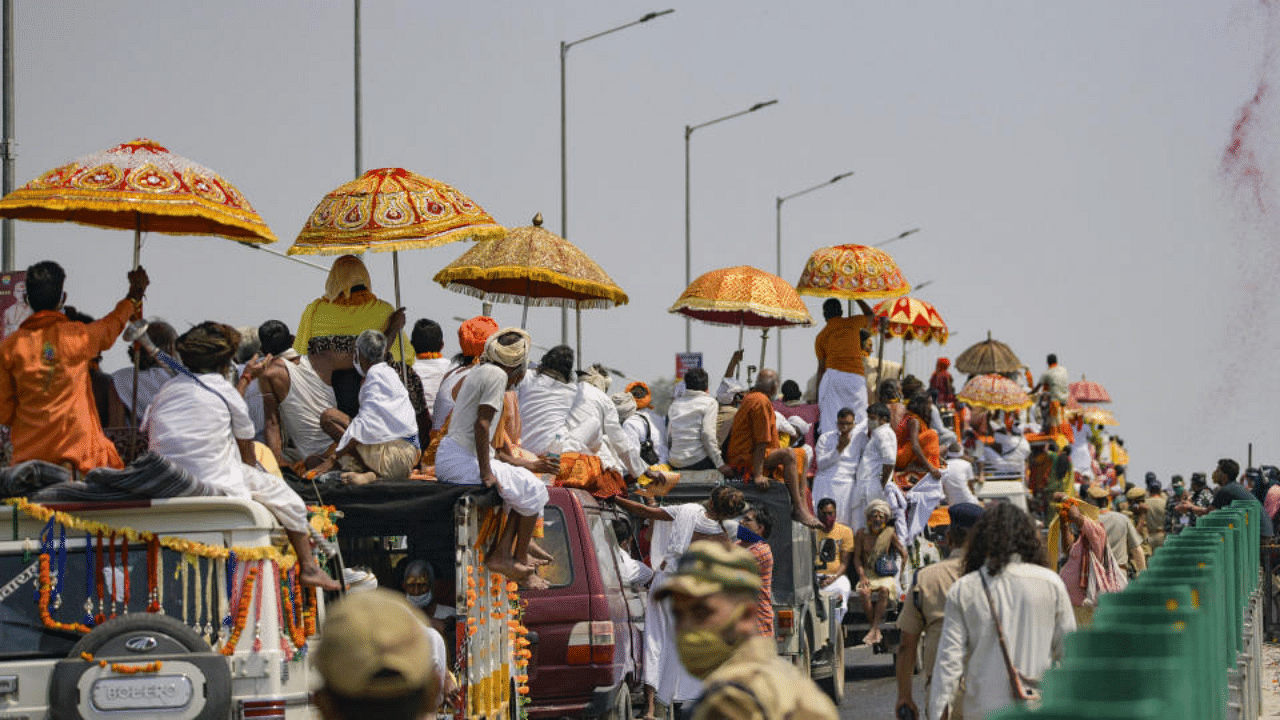
The flood of images of devotees-- a sea of naked bodies of sadhus and sanths at the Kumbh Mela, millions of them, flesh pressing on flesh, masks only on their nether regions, chants issuing out of their gaping cavities in their faces, taking a dip in the Holy Ganga, and then the visuals of hundreds of thousands of people, also crazed devotees but of their political masters, jostling against each other in election rallies, wide-eyed and open-mouthed with party slogans and war cries of Modi or Didi-- made me wonder, can all the waters of the Ganga, the reverberating incantations of the sadhus, and the rousing exhortations of the politicians save the devotees, their leaders themselves, from the raging virus that is killing indiscriminately?
Putting the noisy television on mute, I watched the images of the silent, jumbled millions and their chanting and haranguing messiahs, it seemed a surreal pantomime, as though a pact had been with the devil as they flirted with the virus, a virus that was performing its eerie dance of death. I recalled my first Army posting in the jungles and frontier posts of the Army in Sikkim and later the Assam-Bengal borders.
As a young officer of the regiment, I was made to attend and monitor by my company commander, the ‘machchardani parade’ (mosquito-net repair parade). Once a month, all jawans were lined up on the courtyard of the barracks and their mosquito nets were inspected. Those that had holes were repaired by the regimental tailors. I was surprised but also mortified that I was assigned to supervise this pointless parade. ‘Did I train at the prestigious National Defence Academy only to do this silly chore?‘ I thought
It was also my duty to inspect and ensure that the mosquito nets were drawn down on the beds of jawans at sunset time every day. Disregarding this was a punishable offence. My commander, seeing a cynical smirk on my face, did not lecture me but simply gave me a folder on the Burma Campaign and asked me to read it. In the Burma campaign of 1942-43 during the Second World War, I learnt that the mosquito was more dangerous than the mortar round. Malaria felled and incapacitated more allied soldiers, including thousands of Indian soldiers. This affected more soldiers than even the bullets and artillery shells of the invading Japanese army. I felt deeply embarrassed by my vanity and ignorance.
If such was the rigour with which malaria was fought, why is our response to a virulent virus like Covid-19, which is decimating people around the world in millions and wreaking havoc on our lives and livelihoods, so cavalier?
Writing in his essay, Men Versus Insects, nearly 90 years ago, Bertrand Russel presciently wrote, “Man is safe, except from the little creatures-- the insects and the microorganisms. An acre of forest may have more insects and a single animal more microbes than the entire human population. Insects have an advantage over us -- they devour our food before it is ripe for us. Microbes are altogether a different mysterious universe. There can be no life or death without microbes.” Even the great scientist Louis Pasteur said, “Gentlemen, it’s the microbes who will have the last word.” But he added there is hope through science.
Stark contrast
The battle between men versus the virus is an unequal battle when people of a country fighting the virus are infected with obscurantism, superstition, jingoism and hubris. We have to cure ourselves of this ailment first. There can be salvation from the virus only through science.
When a society that has a rich civilisational past dives down deep into its mythological folklore and finds that the present is in stark contrast to the past, that it has now been scientifically, technologically and developmentally left behind by other advanced economies, it is easy to fall into the trap of worshipping past glories.
It is a convenient way for political and religious leaders, the former promising a utopian future in this world and the latter in the next world, to divert attention out of the present morass the country has sunk into. Such smug wallowing in the past will leave the country deeper in mire and mud. These are not just metaphors. If you were to fall into a bog no amount of prayers invoking our Gods or singing praises to the exploits of our mythic heroes, who had ‘mastered plastic surgery’, or ‘aviation’ and ‘rocketry’ will save us.
The only way to come out of it before being swallowed is to stop being delusional and in denial, and recognise the reality and do everything to strike out of the bog. Our leaders should face the present honestly, shun all sycophants and courtiers, marshal all data, ensuring that the facts presented to them are not distorted or selectively presented. That is the first step.
And then swiftly prepare an action plan to develop capabilities in scaling up vaccination and affordable healthcare infrastructure by consulting the brightest and best minds--doctors, scientists, administrators with integrity--there’s no dearth of them, and execute it flawlessly through a task force that continuously monitors the implementation. Dr Prabhat Jha, chair in global health and epidemiology, University of Toronto, said, “Without data, there is no way for India to walk out of this pandemic. And secrecy in data can only backfire.”
“Man is quite insane. He wouldn’t know how to create a maggot, and he creates Gods by the dozen,” said Montaigne, the celebrated French philosopher. We have surpassed all other peoples of the world in creating Gods.
(The writer is a soldier, farmer and entrepreneur)